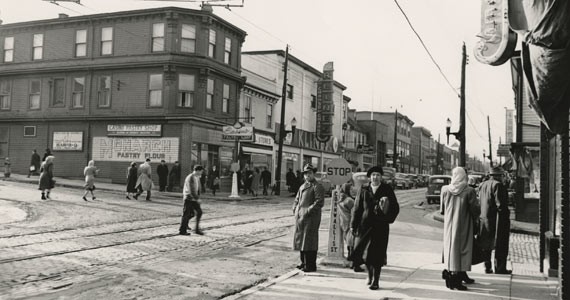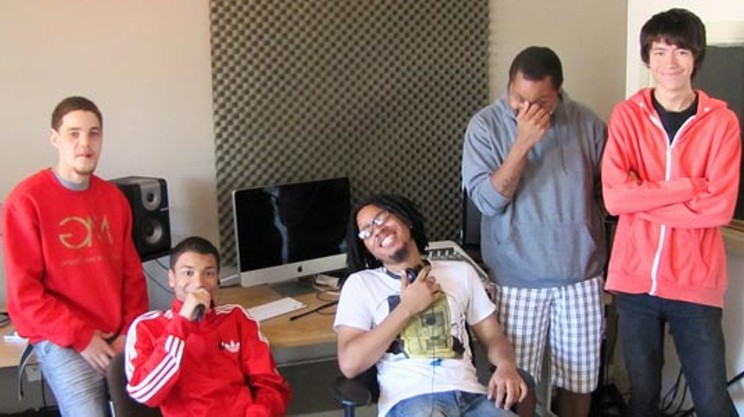Change has been a constant in Gottingen Street's 250-year history. These days change is once again on the lips and in the air of Halifax's north end, and back in 1756, it was no different. The Little Dutch Church was erected on the corner of Brunswick and Gerrish Streets. By the early 1760s, most German settlers to Nova Scotia had moved to Lunenburg County. Those who remained in Halifax lived mainly in the "North Suburb" in close proximity to Dutchtown Street. In 1764, the residents of this area "petitioned the government to name their street Gottingen." On April 6, 1764, Gottingen Street was born.
In 1891, street cars stopped on Gottingen for the first time to the "great exultation in the hearts of Northenders...when they step into the car bound for Cunard and Robie Streets." Some changes caused friction. Violence came to the street in February 1919 when drunk ex-servicemen rioted, targeting businesses owned by Chinese residents. In 1966, a social housing complex, Uniacke Square, opened to shelter the displaced residents of Africville. The street changed once again.
Culturally, Gottingen is the heartbeat of Halifax. From the earliest days to Club Unusual, The Uptown Festival and through to The Bike Shop, The Marquee Club and now The Company House, The Bus Stop Theatre and Plan B, Gottingen Street has changed and moved with the times as it incubated, supported and flavoured a huge portion of this city's culture. Over the years, LGBTQ associations, the Mi'kmaw Native Friendship Centre and numerous social outreach programs found their homes on Gottingen.
In the 250 years since 1764, Gottingen Street has been home to myriad churches, businesses, non-profits, galleries, clubs and cultures. Gottingen has always drawn people looking for a place to call their own.
“I think Gottingen Street is in a lot of ways misinterpreted. There are a lot of negative stereotypes of the street and the area. The festival has brought together so many different groups. It’s going to honour people on the street who have made an impact. We’re not interested really in just honouring people for the sake of honouring people, we want to make sure we build relationships and keep them going forward. The whole sense of community the street has now—we want to amplify it. Recognizing people’s histories as being important, it’s already inspired me to do more things to get the community working together.” - LaMeia Reddick, iMOVe intern.
“My history on the street is very short, but the street itself has had a history that goes back to the founding of the city. It’s interesting to see how the street has changed. In the 1840s-60s it was primarily residential, there were houses there, then eventually those houses slowly turned into businesses, you started to see the street change. For me the most interesting thing is where the Global TV studios are, that’s where the Vogue Theatre was. A lot of people today would recognize that spot as a movie theatre, but the building that was there before was actually a church. The structure was eventually used as a movie theatre, and then a porn theatre in the 70s, then used by the gay and lesbian community as their dance club and community center, a boxing club and now a television studio.” - Nat Smith, Chair of the Gottingen 250 History Committee
“There is change on the street. Everybody knows there is change on the street. The people who have been there for a long time, they’re welcoming the change but they’re also nervous about it. They just want to feel like they are part of the change. The purpose of this festival, and the radio broadcast, and the plaques and all the pieces, is to be inclusive. The uptown has these isolated cultural bubbles and socio-economic bubbles. Everyone gets along but they’re still bubbled. As Alexi, one of our interns, put it, he wants to pop the bubbles. We are trying to pop the bubbles so that it’s one big street rather than different groups feeling isolated from the change or from the street.” -Charlene Gagnon, Program coordinator of iMOVe
“The community has accepted me in a way that is just amazing and has always been incredibly supportive. All the things I’ve learned about the neighbourhood—the challenges it’s faced, the things that have made it what it is—have been from the elders in the community. We don’t hear these stories very often. There’s just so much change. Our proximity to the downtown [core], and some of the changes happening around Cogswell, means the business association tends to be faced with a lot of challenges and decisions. If you’re working hard you also really need to celebrate—those are the pieces connect people and move the other initiatives forward.” - Michelle Strum, North End Business Association (NEBA) board member













